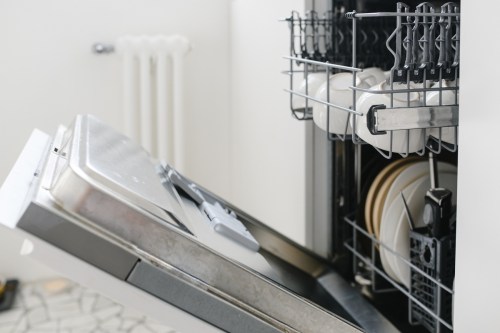You work hard to keep your home clean and smelling fresh. After all, a clean home can reduce the risks of illness and it’s just much more pleasant to live in. Even with all the cleaning hacks in the world, though, keeping the kitchen clean is a constant battle in many homes. That’s why installing a dishwasher feels like it eases the workload in this busy room that’s in constant use.
When your dishwasher starts to get smelly, you may wonder, do dishwashers need to be cleaned out? Dishwashers do actually get dirty. All those food particles spray around inside the appliance and can get stuck in cracks and crevices. If left alone, they’ll start to rot and stink up the place. Here’s how you can clean and deodorize your smelly dishwasher so that it’s sanitized and smelling fresh again.

Clean your smelly dishwasher with a commercial dishwasher cleaner
The quickest and simplest way to get your dishwasher sparkling clean is to use a cleaning product that’s specially formulated to clean this particular machine. These products usually come in the form of packets that are similar in shape and size to dishwasher detergent packets. The cleaning agent is great at ridding your dishwasher of tough grease, limescale, and old food odors.
Step 1: Read the instructions on the label. Most dishwasher cleaning products are used with the method we’ll walk you through, but it’s always wise to double-check the label.
Step 2: Remove all dishes from your dishwasher. You’ll be running the machine empty once the cleaner is added.
Step 3: Take one packet of cleaner and place it into the dishwasher detergent compartment.
Step 4: Turn the dishwasher on the highest setting and let the cleaner get to work. Repeat the process once per month to keep grime and odors at bay.
How do you clean a dishwasher with vinegar and baking soda?
How do you disinfect a dishwasher without using chemicals? If you’re not into the idea of using a commercial cleaner, you can also use vinegar and baking soda to get this crucial appliance odor-free. Just be sure you’re not using the two products during the same washing cycle to avoid a foaming mess.
Step 1: Remove all dishes from your dishwasher.
Step 2: Use a wet rag to clean away any pieces of food debris in the sprayer arms, the filter, and around the lip of the door to be sure no residual food particles are remaining in the appliance. Don’t use bleach to clean the inside of the dishwasher, though, as it can create lethal fumes when combined with vinegar!
Step 3: Fill a glass or otherwise dishwasher-safe bowl with one cup of white vinegar and place the bowl snugly on the top rack of the dishwasher.
Step 4: Run your dishwasher on the hottest setting without dishwashing detergent.
Step 5: Once the cycle completes, remove the bowl of vinegar.
Step 6: Take one cup of baking soda and sprinkle it along the bottom of the dishwasher. This is where food particles tend to collect, so odors will be strongest here.
Step 7: Run your dishwasher again on the hottest setting, still without detergent.
Is vinegar bad for the dishwasher?
You may have heard that the acidity of vinegar can damage certain components of your dishwasher, particularly the rubber seal on the door. While this is true, you’re really only in danger of damaging those components if you’re using vinegar too often in your dishwasher. That’s why we recommend using it only once every few months. It’s also important that you place the bowl of vinegar on the rack instead of placing it in the detergent dispenser. This allows the vinegar to be diluted with water and contained a bit better to prevent it from touching the lip of the dishwasher.
Best practices for keeping your dishwasher odor-free
Now that your dishwasher is sparkling clean and smelling great, you’ll want to avoid the smelly situation in the future. The good news is that there are some regular habits you can implement that will keep odors at bay in this essential appliance. Here are some tips for keeping that dishwasher smelling fresh.
Step 1: Rinse your dishes. Large chunks of food are the root of it all when it comes to foul-smelling dishwashers. Scrape and rinse as much of the food off your dishes as you can before loading them into the appliance.
Step 2: Clean out your dishwasher regularly. It’s recommended that you either use a commercial dishwasher cleaner or wipe out and sanitize this appliance monthly. This keeps food remnants and grime from collecting and kills bacteria before it can become a smelly breeding ground.
Step 3: Use essential oils to freshen up your dishwasher. These oils are non-toxic and safe to use in your dishwasher. A few drops of a lovely citrus scent, like lemon, orange, or even grapefruit, will give your dishwasher an added boost of freshness.
Your dishwasher is essential to your kitchen’s operation, and those foul odors can make it difficult to stomach washing your dishes in it. While every dishwasher eventually gets gross and stinky, with our guide and just a bit of time and effort, yours will be squeaky clean and smelling lovely again.
Editors' Recommendations
- How to clean oven racks the easy way
- The easiest way to get sticker residue off new bowls, plates, furniture, and more
- Sick of cloudy glasses? This is the cleaning hack you need
- How to get rid of that hideous water stain on the ceiling and beautify your home
- How to wash a weighted blanket in 4 simple steps